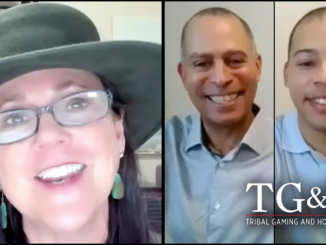The Peter Principle is a term coined by Canadian Educator Laurence J. Peter meaning, “an observation that the tendency in most organizational hierarchies, such as that of a corporation, is for every employee to rise in the hierarchy through promotion until they reach a level of respective incompetence.”
So, in the casino industry, specifically the field of casino Security and Surveillance, how does this principle affect us, even assuming for the moment that it is true? I suppose then that a disclaimer is in order before we start with the usual anecdotal fairy tale:
- Do I think that the Peter Principle is real? Regrettably, in far too many cases, yes.
- Do I think that it is true for everyone? No, not at all and there are ways to overcome it, which is what I will discuss below. But it is true in a general sense, and it is, as a result, something we should be aware of in ourselves and our subordinates, and sometimes even our bosses, and we should work to mitigate against.
Which brings us to our anecdote … one through which you will have to bear with me. There is a point to it, I promise.
Once upon a time, many moons ago, we have a prospective candidate for a croupier in a Casino in Newcastle, in the Northeast of England. Let us call our hero Malcolm. Malcolm learned to be a croupier following a training course that was eight weeks long and that taught him how to chip up and cut down, use “keys” to calculate complex multi-chip payouts, shuffle cards and spin a roulette ball and clear a layout properly (a dying skill), and push out multiple stacks of chips in the right arrangement, and with the correct hand.
Then Malcolm became the proud holder of a “Blue License”, that being the colour of license in the Monarchy of the period, that denoted that you were licensed to be a Croupier in a Casino. So, a Croupier he became (not least because writing his occupation as “Dealer” in his passport led to some raised eyebrows in the future, of which he was, perhaps fortunately blissfully ignorant).
Malcolm was a competent croupier, especially with the math side of the complex interactions with patrons. Certainly, he was considered a “safe pair of hands”, and anyway there was a shortage of Inspectors, so there came a time when he was promoted to the next level and achieved the vaunted Green license of an Inspector, allowing him to supervise other people on table games, and order chip fills as required. But the conversation, upon achieving this undoubted feat went, so far as can be recalled, as follows:
“OK, Malcolm you are an Inspector now.”
“Great…what do I do?”
“Well…you have seen what Inspectors do right? Do that.”
And that was pretty much that. There was no additional training.
Malcolm wasn’t promoted to be an Inspector because someone undertook any sort of job assessment and thought that he would be good at it, he actually got it because the club was short of inspectors and he was a good dealer who had met the minimum time in position to get a promotion, but no one really wants to learn something like that.
Malcolm was a good Dealer, navigating the mechanics of the Table Games dealt. But would that automatically mean that he was going to make a good Inspector, a job with a very different skillset that involved more checking, supervision and dealing with troublesome patrons? Worse, what if he had stuck around and not gone to Florida and been promoted to Pit Boss? His casino skills still, ultimately, resting on an eight-week course to make him a competent Dealer? Many people did follow this exact route. Some, indeed, went even further.
The Perils of Peter (and Malcolm)
We see this throughout the business landscape. People are “good” at what they do, they really are, but then there is pressure to get that promotion and to “move on” and to “advance” and to do a different job, that they have been selected for based upon prior performance in a different role; not a cool appreciation of who would be the best fit for the new skillset needed; and this can lead to difficulties.
One of the difficulties, or rather the outcomes, is that they revert to the earlier skillset whenever possible, because they are more comfortable there. I have seen Surveillance Supervisors and Shift Managers who, on a routine basis, revert to reviewing tables and incidents and disputes themselves, instead of overseeing the tasks from a loftier view. Why is that? Because they were comfortable as Surveillance Operators, they were good Surveillance Operators, they enjoyed that part of the job and so they go back to it.
I know of Heads of Security who “do a turn” on the Gaming Floor and are amongst the first to get involved when there is a physical altercation. This might well be great for moral and shows the team that you are still willing to get involved. But is it the best use of a Security Manager? Once you are involved you have lost any sort of tactical control over the situation. If something else is happening, somewhere else on the floor, well that is just tough, because you can no longer be told and can no longer do anything else about it.
The other potential outcome is akin to a paralysis. The staff member, recognising at some level, perhaps even subconsciously, that they are not comfortable or do not really understand what they are supposed to be doing, become passive. No real decisions are being made. No strategic planning. What is needed isn’t understood and so decisions are avoided, or sub-optimal snap judgements are selected.
This is The Peter Principle in action.
There are many, many historical precedents for this too. So, what can we do about it?
Well, one of the first things that can be done, to my mind, would be to have a good quality job description for every job that you have any sort of control over. This job description should also contain some information on the sorts of skills that should be required to be good at this job. This will give you a baseline that you can measure candidates against.
Once you have this baseline you can also consider staff members who are already in the position that you are assessing. Who among them has the skills to make them good at the job and what are these personal skills or traits, do they match the list of skills that you have sketched in for the job? If not them maybe you need to add some extra skills.
Only now do you need to consider the staff members who you are thinking of promoting. They should be graded against what they need to be able to do, to do the job that you want to promote them into. Sometimes you will find that the staff who you think would be a good fit for the next step are not necessarily the ones who are good, or the best, at the skills and abilities needed at the lower rung. Perhaps this will often be the case. But if they are the best fit for the next step then they should get their chance at it.
The benefits here are also manifest when you need to explain to candidates who have been unsuccessful why they have been unsuccessful.
I have heard gripes, I would wager that we all have, where someone who did not get promoted complains about the person who did and, at some point, words to the effect of: “…but I am so much better at X then them.” are said. With “X” being what they do now. Doubtless this could well be true. But it is beside the point. You aren’t being judged on what you did do, but on your potential to be successful in what you are going to do.
It also gives a roadmap for any candidate who wishes to be promoted at any point in the future. Because it details what you are looking for and it gives an idea of what must be done to be a better prospective candidate. A plan not dependant upon current competence, that might well not even translate to anything approaching future competence, but that is based, as far as practical, upon the actual, necessary, skills.
Education as Investment
Anyone who has ever met me knows that I am a fan of lifelong learning. I also happen to believe that, especially if you are in the Surveillance side of the Casino Industry, one of the most important attributes that you can have; the attribute that I have demanded when recruiting my own teams for the various operations I ran back in the day, is curiosity.
You must be curious. You must be curious about people, and you have to be curious about events. Why did that happen? What happened there? Why did they do that? Other things can be taught, pretty much anything can be taught truth to tell. But curiosity is an innate trait, one I sometimes fear conformity beats out of us.
So, what can we do with curiosity? We can use it to drive a personal quest for training, for betterment, for understanding.
If we unlock promotion from the shackles of basing it on being good at something completely different to what you are applying for, then we enable people to get training to make them better at the position they are aiming for, not necessarily what they hope to move on from doing. What additional interpersonal, or analytic, skills might be needed for the next step? What might you need to learn to be great after your promotion, not great before it?
Where can you find the skills, you need and how might you be nurtured by your organisation to avoid the Perils of the, all too real, Peter Principle? How can an organisation itself shift how it operates to better develop and nurture its own workforce?
I leave the potential answer to that to you. But it is something to think about.




